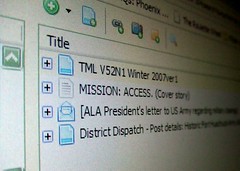About Zotero
Zotero (pronounced "zoh-TAIR-oh") is a browser tool that collects, manages, and cites research sources. It's easy to use, lives in your web browser where you do your work, and best of all it's free. Zotero allows you to attach PDFs, notes and images to your citations, organize them into collections for different projects, and create bibliographies using Word or OpenOffice. It is easier to use than RefWorks and surprisingly powerful.
Since it's a browser plugin, it automatically updates itself periodically to work with new online sources and new bibliographic styles.
Using This Guide
This guide is several pages long -- use the tabs along the side to navigate through topics.
Zotero Quick Start Guide
See also this great guide published by the Zotero developers themselves. Also available as a PDF.
Zotero Workshops
Contact Ellen if your class or department would like to request a session.
Learn how to use Zotero to easily save citations from web sites and library catalogs, and use the Word toolbar to automatically format them in your papers.
All workshops are free to the Baylor community!
Using Zotero for Citation Management: Upcoming Workshops
Zotero Tutorials
Click to watch a screencast video of a virtual Zotero tutorial recorded by Ellen Filgo on 8/28/20
Zotero.org has a link to more great video tutorials on their site:
Zotero Blog
Zotero alternatives
Check out RefWorks as an alternative, or see what other citation managers can do:



